Genealogy
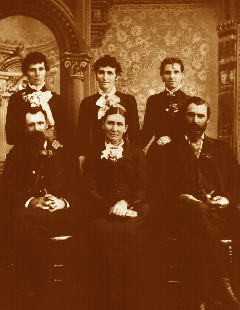 A genealogy establishes identity by
providing an inventory of historical links in the form of resemblances between
that which is unique and that which is general. In terms of the archeology of
human thought, an idea is linked to its predecessor and the contemporary world
of ideas through a genealogy of derivation, inspiration and association.
Likewise, the development of an individual human personality can be described
in terms of a cultural genealogy in regards to the world of ideas which the
individual has been exposed. But equally important, there is the actual family
genealogy upon which an individual's physical existence depends and without
which obviously, a world of ideas would not exist.
A genealogy establishes identity by
providing an inventory of historical links in the form of resemblances between
that which is unique and that which is general. In terms of the archeology of
human thought, an idea is linked to its predecessor and the contemporary world
of ideas through a genealogy of derivation, inspiration and association.
Likewise, the development of an individual human personality can be described
in terms of a cultural genealogy in regards to the world of ideas which the
individual has been exposed. But equally important, there is the actual family
genealogy upon which an individual's physical existence depends and without
which obviously, a world of ideas would not exist.
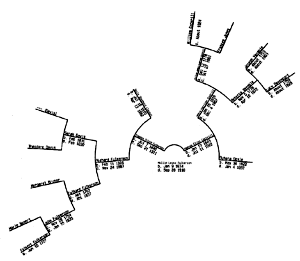 A genealogy has a rather
curious structure. Its analysis cannot exist as a reductive act, but rather it
works counter to contemporary thought, and it is an expansive act that
increases its level of complexity with each 'discovery.' With the increased
knowledge of the details of its narrative, comes the increased awareness of how
little is known of the narrative.
A genealogy has a rather
curious structure. Its analysis cannot exist as a reductive act, but rather it
works counter to contemporary thought, and it is an expansive act that
increases its level of complexity with each 'discovery.' With the increased
knowledge of the details of its narrative, comes the increased awareness of how
little is known of the narrative.
If one for example, attempts to reconstruct the various
links to ancestors which lead up to their own existence, one finds it to be an
impossible and ridiculous task. Not only is it irrational because the past
recedes to a point that can never be known, but even within that which can be
knowable there are gaps, confusions, contradictions, and links to dead-ends. A
single piece of information can change the whole structure of a genealogy as
instantly as it is known. Often, one finds no way out of the contradictions,
and in the case of multiple versions, there is no logical means of determining
'what is real.' Ultimately, the reality of one's own personal history can only
be perceived as some sort of Platonic absolute which certainly exists but can
be only indirectly experienced in the shadows.
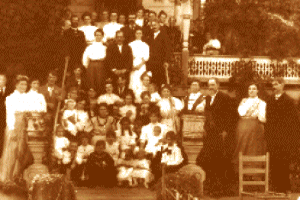 As for what exactly is inherited by
the human personality is not clear either from the study of a family history.
Though many have tried, one can not explain a writer's fiction for example, by
mere examination of the biographical details. Certainly, inheritance of similar
DNA patterns is a weak second as the source of personality development and
quality of individual character, with all the eggs being placed presently by
contemporary thought in the environmental factor's basket.
As for what exactly is inherited by
the human personality is not clear either from the study of a family history.
Though many have tried, one can not explain a writer's fiction for example, by
mere examination of the biographical details. Certainly, inheritance of similar
DNA patterns is a weak second as the source of personality development and
quality of individual character, with all the eggs being placed presently by
contemporary thought in the environmental factor's basket.
Biological heredity however, is the structure upon which
environmental forces are articulated. More than likely it seems though, that
one inherits the dreams and failures of their ancestors. This takes the form of
the person's situation at birth, the understanding of which can be elucidated
or made resonate with the social and natural order of one's environment by the
family stories which tend to haunt through out our lives. This no doubt is at
the basis of a personal identity.
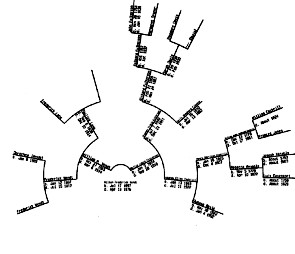 The present day living
memory of the family narrative is quite ephemeral though and it slips off
fairly quickly in the ozone even under the slightest scrutiny. Often those
informants who are closer to previous family events disagree with one another
on what actually transpired, as well as themselves being subject to various
organic failures and inaccuracies through their own personal agendas.
Similarly, the paper trace that each person leaves behind represents just the
social/political/economic identity of that person in the society. Such
information is subject to the filters of gender, race, and economic status.
They describe the individual as a political entity rather than a personality.
The present day living
memory of the family narrative is quite ephemeral though and it slips off
fairly quickly in the ozone even under the slightest scrutiny. Often those
informants who are closer to previous family events disagree with one another
on what actually transpired, as well as themselves being subject to various
organic failures and inaccuracies through their own personal agendas.
Similarly, the paper trace that each person leaves behind represents just the
social/political/economic identity of that person in the society. Such
information is subject to the filters of gender, race, and economic status.
They describe the individual as a political entity rather than a personality.
Actually under closer examination, these political filters
are also very much a part of living memories as well. What is remembered are
those aspects of personality and actions that either enhanced or distracted
from the society in which the individual existed in. When a person is neither
'too good' or 'too bad' they leave behind little to be discussed by the
remaining family members or recorded by the bean counters of society.
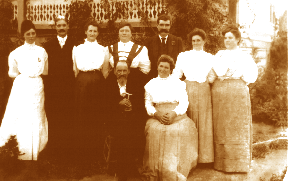 Occasionally however, one may find a
'strange attractor' in family research -- for no particular reasons that can be
understood, there are more stories and historical mementoes left behind for
this individual than any of their surrounding kin. One always suspects some
forgotten secret behind this though -- a story whose content has been surprised
into forgetfulness, but which is so irregular and bizarre that it places
special attention, similar to a bookmark on a certain ancestor.
Occasionally however, one may find a
'strange attractor' in family research -- for no particular reasons that can be
understood, there are more stories and historical mementoes left behind for
this individual than any of their surrounding kin. One always suspects some
forgotten secret behind this though -- a story whose content has been surprised
into forgetfulness, but which is so irregular and bizarre that it places
special attention, similar to a bookmark on a certain ancestor.
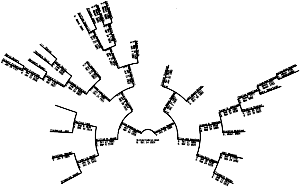 The connections between
the various family members becomes tangled and mired in confusions. One begins
with the thought that their family, because they are the ones first known, are
separate from the rest of the world ('us and them' being the fundamental basis
for human selection). No family link obviously exists in a vacuum however, nor
can it be studied that way. One quickly discovers convoluted interactions that
go off into several dimensions at once.
The connections between
the various family members becomes tangled and mired in confusions. One begins
with the thought that their family, because they are the ones first known, are
separate from the rest of the world ('us and them' being the fundamental basis
for human selection). No family link obviously exists in a vacuum however, nor
can it be studied that way. One quickly discovers convoluted interactions that
go off into several dimensions at once.
Narrative as genealogy therefore, is the encoding and
subsequent collapse of all these considerations upon a serial, compact,
monophonic line. It is not so much reduction as it is loss of resolution
through forgetfulness. It is a self-obfuscating structure that confounds more
than elucidates when one attempts to dissect it. Worlds are hidden in its
ironies. It is a story whose shear existence is its only true motivational
engine and its conclusion is by exhaustion rather than logic.

Last Modified 16 July 1997
 A genealogy establishes identity by
providing an inventory of historical links in the form of resemblances between
that which is unique and that which is general. In terms of the archeology of
human thought, an idea is linked to its predecessor and the contemporary world
of ideas through a genealogy of derivation, inspiration and association.
Likewise, the development of an individual human personality can be described
in terms of a cultural genealogy in regards to the world of ideas which the
individual has been exposed. But equally important, there is the actual family
genealogy upon which an individual's physical existence depends and without
which obviously, a world of ideas would not exist.
A genealogy establishes identity by
providing an inventory of historical links in the form of resemblances between
that which is unique and that which is general. In terms of the archeology of
human thought, an idea is linked to its predecessor and the contemporary world
of ideas through a genealogy of derivation, inspiration and association.
Likewise, the development of an individual human personality can be described
in terms of a cultural genealogy in regards to the world of ideas which the
individual has been exposed. But equally important, there is the actual family
genealogy upon which an individual's physical existence depends and without
which obviously, a world of ideas would not exist. A genealogy has a rather
curious structure. Its analysis cannot exist as a reductive act, but rather it
works counter to contemporary thought, and it is an expansive act that
increases its level of complexity with each 'discovery.' With the increased
knowledge of the details of its narrative, comes the increased awareness of how
little is known of the narrative.
A genealogy has a rather
curious structure. Its analysis cannot exist as a reductive act, but rather it
works counter to contemporary thought, and it is an expansive act that
increases its level of complexity with each 'discovery.' With the increased
knowledge of the details of its narrative, comes the increased awareness of how
little is known of the narrative. As for what exactly is inherited by
the human personality is not clear either from the study of a family history.
Though many have tried, one can not explain a writer's fiction for example, by
mere examination of the biographical details. Certainly, inheritance of similar
DNA patterns is a weak second as the source of personality development and
quality of individual character, with all the eggs being placed presently by
contemporary thought in the environmental factor's basket.
As for what exactly is inherited by
the human personality is not clear either from the study of a family history.
Though many have tried, one can not explain a writer's fiction for example, by
mere examination of the biographical details. Certainly, inheritance of similar
DNA patterns is a weak second as the source of personality development and
quality of individual character, with all the eggs being placed presently by
contemporary thought in the environmental factor's basket.  The present day living
memory of the family narrative is quite ephemeral though and it slips off
fairly quickly in the ozone even under the slightest scrutiny. Often those
informants who are closer to previous family events disagree with one another
on what actually transpired, as well as themselves being subject to various
organic failures and inaccuracies through their own personal agendas.
Similarly, the paper trace that each person leaves behind represents just the
social/political/economic identity of that person in the society. Such
information is subject to the filters of gender, race, and economic status.
They describe the individual as a political entity rather than a personality.
The present day living
memory of the family narrative is quite ephemeral though and it slips off
fairly quickly in the ozone even under the slightest scrutiny. Often those
informants who are closer to previous family events disagree with one another
on what actually transpired, as well as themselves being subject to various
organic failures and inaccuracies through their own personal agendas.
Similarly, the paper trace that each person leaves behind represents just the
social/political/economic identity of that person in the society. Such
information is subject to the filters of gender, race, and economic status.
They describe the individual as a political entity rather than a personality.
 Occasionally however, one may find a
'strange attractor' in family research -- for no particular reasons that can be
understood, there are more stories and historical mementoes left behind for
this individual than any of their surrounding kin. One always suspects some
forgotten secret behind this though -- a story whose content has been surprised
into forgetfulness, but which is so irregular and bizarre that it places
special attention, similar to a bookmark on a certain ancestor.
Occasionally however, one may find a
'strange attractor' in family research -- for no particular reasons that can be
understood, there are more stories and historical mementoes left behind for
this individual than any of their surrounding kin. One always suspects some
forgotten secret behind this though -- a story whose content has been surprised
into forgetfulness, but which is so irregular and bizarre that it places
special attention, similar to a bookmark on a certain ancestor. The connections between
the various family members becomes tangled and mired in confusions. One begins
with the thought that their family, because they are the ones first known, are
separate from the rest of the world ('us and them' being the fundamental basis
for human selection). No family link obviously exists in a vacuum however, nor
can it be studied that way. One quickly discovers convoluted interactions that
go off into several dimensions at once.
The connections between
the various family members becomes tangled and mired in confusions. One begins
with the thought that their family, because they are the ones first known, are
separate from the rest of the world ('us and them' being the fundamental basis
for human selection). No family link obviously exists in a vacuum however, nor
can it be studied that way. One quickly discovers convoluted interactions that
go off into several dimensions at once.